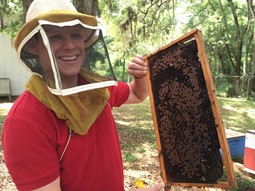One Entomologist’s Quest to Develop IPM Approaches for Beekeepers in Florida
Meet Cameron Jack, Ph.D., entomologist and lecturer at the University of Florida, beekeeping expert, and one of the very few lecturers in the country focusing his teaching efforts exclusively on the development of innovative beekeeping courses. (Photo courtesy of Cameron Jack, Ph.D.)
By: Lorena Lopez, Ph.D.
Editor’s Note: This is the next post in the “Standout ECPs” series contributed by the Entomological Society of America’s Early Career Professionals (ECP) Committee, highlighting outstanding ECPs that are doing great work in the profession. (An ECP is defined as anyone within the first five years of obtaining their terminal degree in their field.) Learn more about the work ECPs are doing within ESA, and read past posts in the Standout ECPs series.
Cameron Jack, Ph.D., is a lecturer and the distance education coordinator at the University of Florida, where he teaches several beekeeping courses and spends most of his time outside the classroom working closely with students interested in research. He earned his bachelor’s in biology at Southern Utah University in 2012, his master’s degree in horticultural science at Oregon State University in 2015, and his Ph.D. in entomology at the University of Florida in 2020. As Cameron was uniquely prepared to create a beekeeping instructional program, he was offered his current position in 2018, two years before earning his doctoral degree. His Ph.D. research investigated both chemical and non-chemical approaches to controlling the honey bee pest Varroa destructor. Additionally, Cameron worked on projects focused on rearing the mite in vitro and screened new chemical compounds that could be used in the control of the pest. Below, we asked Jack a few questions about his work and professional life.
Lopez: Can you describe your current research?
Jack: I am really driven to aid the suffering beekeeping industry, so naturally I am interested in solving problems for beekeepers. Most of my work is very applied, testing specific chemical applications, finding effective doses, monitoring the effect of treatments to honey bee colonies, etc. As a lecturer, I don’t have a formal research appointment, but I do have a lot of undergraduate students interested in research. One of my favorite parts of my job is that I get to teach young students how to develop questions, conduct literature reviews, design experiments, collect data, and communicate research findings.
I am teaching eight courses each year, which means I interact with a lot of students. One course uses the C.U.R.E. model (Course-based Undergraduate Research Experience) where the students work with me and the other members of the Honey Bee Research and Extension Laboratory at the University of Florida to conduct a publishable research project as part of the course. As part of this class, I’ve been able to conduct research on the effects of neonicotinoid pesticides on honey bee behavior and how spatial distributions within apiaries effects honey bee drifting.
To read the full interview go to:
One Entomologist’s Quest to Develop IPM Approaches for Beekeepers in Florida







